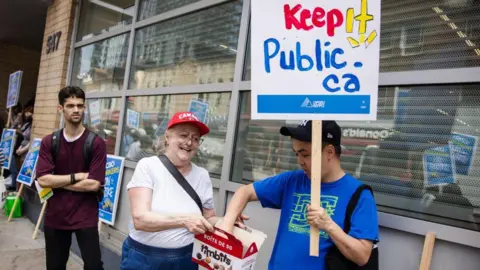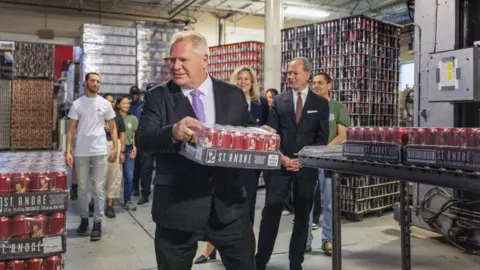Inside Canada's booze battle over canned cocktails
 Toronto Star via Getty Images
Toronto Star via Getty ImagesLast week, Ontario Premier Doug Ford posted a video online with a message for his Canadian province.
It seemed like a typical innocuous political advertisement - Mr Ford sporting a casual black polo shirt and a blue apron, standing at a barbecue grilling burgers, cans of beer at hand.
“It’s summertime in Ontario,” the premier said, beaming into the camera.
Instead, the video was a shot across the bow, with the premier launching an interactive map of local breweries, wineries and distilleries.
It was a strategic move in the midst of liquor labour dispute that has snarled summer alcohol sales in Canada's most populous province.
For the first time in its history, workers at Ontario’s liquor retailer are on strike. The battle has shone a spotlight on the province's peculiar and, some say, outdated liquor control system.
On 5 July, the more than 9,000 employees of the provincially owned Liquor Board of Ontario (LCBO) walked off the job after negotiations for a new collective agreement between their union and Mr Ford’s government fell apart. The LCBO then shuttered all its 650 stores for at least two weeks.
This week, the Ontario Public Services Employees Union (OPSEU) returned to the bargaining table with the province. But talks resumed after another salvo from Mr Ford: the premier has promised to accelerate plans to put canned cocktails in privately run retailers - the primary sticking point for the union.
For a brief moment on Friday, it seemed the dispute was resolved, after the union representing LCBO workers announced that a tentative deal had been reached that would reopen liquor stores in a few days.
But it backtracked during a scheduled news conference with reporters that lasted just two minutes, during which they claimed that Mr Ford's government had refused to sign their return-to-work order.
"We were prepared to come here to announce a deal," said union spokesperson Katie Arnup. "We do not have a deal. The strike continues."
Soon after, the LCBO told its side of the story: It accused the workers' union of negotiating in "bad faith", saying it introduced new demands around money that should have been dealt with at the bargaining table. It also vowed to file an unfair labour complaint against the union, signalling that the fight is not yet over.
Slow evolution of Ontario liquor laws
The LCBOs scattered through Ontario today - generally well-stocked, clean and some consumers will argue, overpriced - are the product of a nearly century-old decision that gave the Crown corporation control over the distribution and sale of liquor in the province.
For years, the whole system maintained distinctive traces of temperance-era policy.
Customers were required to obtain a separate liquor permit before placing an order with a clerk, who could deny any order they believed was too large. Alcohol was not openly displayed. Stores were hidden away from main streets, and purchases were packed away in discreet paper bags.
Slowly, starting in the 1950s and 1960s, the LCBO evolved into a more consumer-friendly operation, now with wine tasting and free drink samples and a glossy LCBO-branded food and drink magazine. (Though self-service, which allows customers to grab their preferred alcohol directly off store shelves, was only fully phased in by the late 1980s).
Ontarians could get beer from the brewer consortium-owned The Beer Store and, later, in the 1990s, Ontario-made wine from The Wine Rack, owned by the Ontario Teachers' Pension Plan.
But for the most part the LCBO has enjoyed an iron-clad monopoly on Ontario alcohol sales.
As most other provinces, like Alberta, British Columbia and Prince Edward Island, moved to liberalise their liquor sales and allow for privately run stores, Ontario stayed mostly the same.
In 2015, things started to shift. The first grocery stores in Ontario were authorised to sell six-packs of beer - a change described at the time as the biggest shake-up to alcohol sales since Prohibition.
“It was one small purchase for a politician, one giant leap for Ontario beer consumers,” read one article in the Toronto Star of the very first grocery store beer purchase by then Premier Kathleen Wynne.
Today, 450 grocery stores across the province are licensed to sell beer, wine and cider.
So amid the strike, Ontarians are not facing an entirely dry summer. They can still place limited LCBO delivery orders online, and purchase wine, beer and cider from some stores.
 Getty Images
Getty ImagesReady-made cocktails the ‘line in the sand’
A bigger change is now around the corner.
Starting this month, convenience stores, big-box stores and grocers will all be eligible to sell wine, beer, cider and ready-to-drink cocktails like hard seltzers.
OPSEU says pre-made cocktails pose an existential crisis to the LCBO's business.
“This is our line in the sand and we are making history,” said president JP Hornick on the first day of the strike.
“We are here today because of the Ford government’s plan to try and expand privatisation of alcohol sales… That puts every Ontarian at risk.”
And, OPSEU says, the change threatens the C$2.5bn ($1.83bn; £1.42bn) LCBO sales net for provincial coffers.
But Mr Ford argues the plan will give small businesses a shot at the market while still leaving the LCBO with a considerable competitive advantage.
Under the new plan, the LCBO remains the only retailer of high-alcohol spirits like gin and whisky, as well as the only wholesaler and primary distributor of alcohol in Ontario.
"Keep in mind when, when you're the wholesaler, that's where you make money," the premier said last week.
The proposal also gives Mr Ford a chance to deliver on a pledge in time for the next election, currently scheduled for 2026.
“He campaigned on this,” said Walid Hejazi at the University of Toronto's Rotman School of Management.
“It’s a winning issue for the Conservatives,” added Mr Hejazi, who noted he worked as a consultant for the LCBO about 15 years ago.
“The province is proposing a strategy that will lower the price I have to pay and make it more convenient… who doesn’t want cheaper alcohol and more convenience?”
'The ship has sailed'
Another problem for the LCBO is that the sting of the LCBO's strike has been dulled considerably by the small amount of liquor liberalisation the province already has.
Ontarians, for the most part, are not up in arms, with access to alcohol at hundreds of wineries, grocery stores and beer stores that remain open.
“What if you went on strike and hardly anyone noticed?” read the first line of a Globe and Mail editorial.
Public polling has seemed to reflect the ambivalence, with just 15% of Ontarians saying they have been personally affected by the strike.
(A tourism industry group says the strike is affecting the operations of 35% of poll respondents in the sector due to limited product availability and slow fulfilment).
But they aren't necessarily on Team Ford, either. An internal poll by Mr Ford's government indicates that while many support liquor liberalisation, a little over half back the strike action.
Many Ontarians did, however, take notice of the Conservative premier's interactive alcohol retail map, which may have annoyed more voters than the shuttered stores.
The province’s efforts to unveil an alcohol-finder soon after the strike began raised questions about the government’s priorities, with one resident suggesting a better use would be a map of family doctors that are accepting new patients.
Dr Adil Shamji, a provincial Liberal politician, said he "routinely" gets calls from constituents for help finding doctors, childcare or affordable housing.
"Never, including after this strike, have I had people calling my office asking for help in finding booze," he said.
Dr Shamji said he wants both sides to get back to get a deal done, one with protections for the LCBO.
For his part, Mr Ford says he is ready to keep negotiating but on canned cocktails at least, he is not budging.
"If they want to negotiate over [ready-to-drink beverages], the deal's off. I'm gonna repeat that: that ship has sailed," he said.
